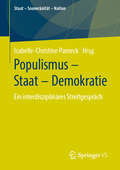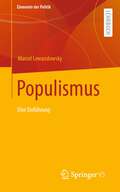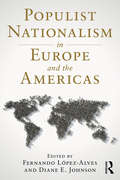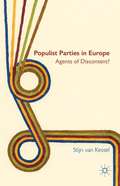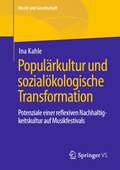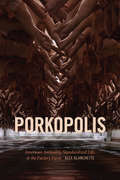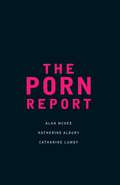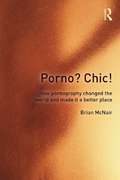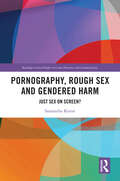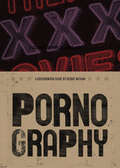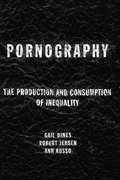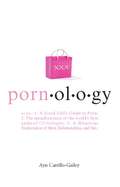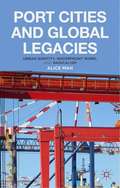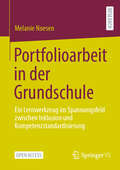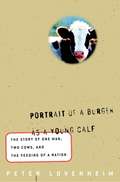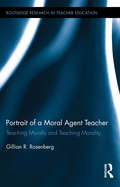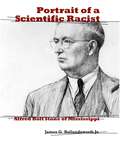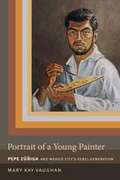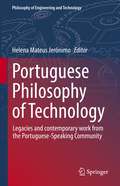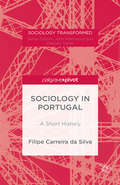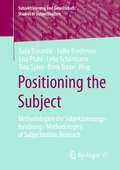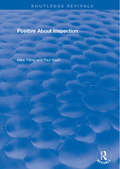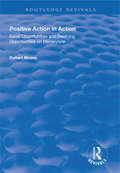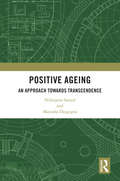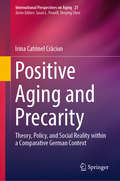- Table View
- List View
Populismus – Staat – Demokratie: Ein interdisziplinäres Streitgespräch (Staat – Souveränität – Nation)
by Isabelle-Christine PanreckZwar fällt die Populismusforschung auf den ersten Blick ins Kerngebiet der Politikwissenschaft, aber keine Geistes- oder Sozialwissenschaft verschließt sich der Debatte. Dabei erfolgt eine interdisziplinäre Verknüpfung der einzelnen Diskussionsfäden bislang nur vereinzelt. Der Sammelband stößt in die Lücke, indem er erstmals Vertreterinnen und Vertreter der Kunst-geschichte, Ökonomie, Philosophie, Politikwissenschaft, Politolinguistik, Städtebau/Architektur und Theologie zum Streitgespräch versammelt.
Populismus: Eine Einführung (Elemente der Politik)
by Marcel LewandowskyDas Lehrbuch bietet eine einführende Darstellung des Populismus in allen relevanten Facetten. Namentlich adressiert das Buch seine unterschiedlichen Manifestationen (als Ideologie, Parteiprogramm und individuelle Einstellung), stellt den Populismus in vergleichender Perspektive vor und analysiert die Ursachen für den Wahlerfolg populistischer Parteien. Ferner diskutiert das Buch die Auswirkungen populistischer Parteien auf die Demokratie und den Parteienwettbewerb.
Populist Nationalism in Europe and the Americas
by Fernando López-Alves Diane E. JohnsonPopulist nationalism fuses beliefs that citizens are being exploited by a privileged elite with claims that the national culture and interests are under threat from enemies within or without. Ideologically fluid, populist nationalists decry “out-of-touch” institutions such as political parties and the mainstream press while extolling the virtues of the “people.” They claim that only populists can truly represent the nation and solve its problems, and often call for unorthodox solutions that appeal to the common people. The recent spread of populist nationalism throughout the world has triggered a growing interest in the subject, led mainly by journalists. The Brexit vote and the election of Donald Trump in the US have provoked a flurry of media coverage in Europe and the Americas, along with parliamentary debates. Some social scientists have sought to explain the resurgence of nationalism and the spread of populism in recent decades, but important questions remain and most of the scholarship has not adequately addressed the fusion of nationalism and populism. It fails to examine the combination of populism and nationalism comparatively, especially the contrast between the more progressive and leftist versions such as those in Latin America, and the more traditional conservative varieties that are gaining strength in Germany, the United Kingdom, and the United States. This interdisciplinary collection by experts on Europe and the Americas fills this void. The volume examines various experiences with populist nationalism, and offers theoretical tools to assess its future. Some chapters are in-depth country case studies and others take a broader perspective, but all open the door for meaningful comparison.
Populist Parties in Europe: Agents of Discontent?
by Agents Of DiscontentPopulism is a concept that is currently in vogue among political commentators and, more often than not, used pejoratively. The phenomenon of populism is typically seen as something adverse and, in the European context routinely related to xenophobic politics. What populism exactly is and who its main representatives are, however, often remains unclear. This text has two main aims: to identify populist parties in 21st century Europe and to explain their electoral performance. It argues that populist parties should not be dismissed as dangerous pariahs out of hand but rather that their rise tells us something about the state of representative democracy.
Populärkultur und sozialökologische Transformation: Potenziale einer reflexiven Nachhaltigkeitskultur auf Musikfestivals (Musik und Gesellschaft)
by Ina KahleMusikfestivals gelten in der Regel nicht als Orte gelebter ökologischer Nachhaltigkeit. Ein anscheinend unbedachter Umgang mit benötigten Ressourcen sowie der oftmals unverhältnismäßige Konsum von Alkohol sprechen zunächst nicht dafür, dass gerade hier eine Chance für einen im nachhaltigen Sinne erforderlichen Wertewandel der Gesellschaft liegt.Dieses Buch widmet sich einem in diesem Kontext bisher weitgehend unbeachteten Aspekt von Musikfestivals: In einer umfangreichen empirischen Studie werden auf verschiedenen Musikfestivals beobachtete drastische Veränderungen von Verhaltensmustern der Besucher und die Gründe hierfür untersucht. Unter den Festivalgästen wird ein habitueller Grundmodus ausgemacht, der sich relevant von dem in deren Alltag unterscheidet. Es wird der Frage nachgegangen, welches Potenzial für die sozialökologische Transformation von Gesellschaften der Beibehaltung dieses Grundmodus über die Grenzen der Festivals hinaus innewohnt.
Porkopolis: American Animality, Standardized Life, and the Factory Farm
by Alex BlanchetteIn the 1990s a small midwestern American town approved the construction of a massive pork complex, where almost 7 million hogs are birthed, raised, and killed every year. In Porkopolis Alex Blanchette explores how this rural community has been reorganized around the life and death cycles of corporate pigs. Drawing on over two years of ethnographic fieldwork, Blanchette immerses readers into the workplaces that underlie modern meat, from slaughterhouses and corporate offices to artificial insemination barns and bone-rendering facilities. He outlines the deep human-hog relationships and intimacies that emerge through intensified industrialization, showing how even the most mundane human action, such as a wayward touch, could have serious physical consequences for animals. Corporations' pursuit of a perfectly uniform, standardized pig—one that can yield materials for over 1000 products—creates social and environmental instabilities that transform human lives and livelihoods. Throughout Porkopolis, which includes dozens of images by award-winning photographer Sean Sprague, Blanchette uses factory farming to rethink the fraught state of industrial capitalism in the United States today.
Porn Report
by Alan McKee Catharine Lumby Kath AlburyTrue or false: Most porn users are uneducated, lonely and sad old men All porn is violent Pornography turns people into rapists and/or paedophiles Pornography uniformly portrays women as passive objects of men's sexual urges The Porn Report debunks these and many other misconceptions about porn consumers, producers and the industry at large. In the first comprehensive examination of the production and consumption of pornography in Australia, Alan McKee, Kath Albury and Catharine Lumby present a wide-ranging view of the adult-content industries and its consumers. If you've ever wondered what's in Australia's bestselling 50 porn videos and DVDs; what's behind amateur or do-it-yourself porn; and how porn is produced and distributed, The Porn Report will not only answer your questions, but also surprise you. The authors also discuss feminist responses to pornography and provide important advice to parents on how they can protect their children from cyberstalkers and from viewing online porn. If pornography arouses, repels or simply piques your curiosity, you cannot afford to miss The Porn Report.
Porno? Chic!: how pornography changed the world and made it a better place
by Brian McNairPorno? Chic! examines the relationship between the proliferation of pornography and sexualised culture in the West and social and cultural trends which have advanced the rights of women and homosexuals. Brian McNair addresses this relationship with an analysis of trends in sexualised culture since 2002 linked to a transnational analysis of change in sexual politics and sex/gender relations in a range of societies, from the sexually liberalised societies of advanced capitalism to those in which women and homosexuals remain tightly controlled by authoritarian, patriarchal regimes. In this accessible, jargon-free book, Brian McNair examines why those societies in which sexualised culture is the most liberalised and pervasive are also those in which the socio-economic and political rights of women and homosexuals have advanced the most.
Pornography, Rough Sex and Gendered Harm: Just Sex on Screen? (Routledge Critical Studies in Crime, Diversity and Criminal Justice)
by Samantha KeeneExploring the nuances and complexities in men’s and women’s accounts of how mainstream pornography is experienced in their everyday lives, this book demonstrates how pornography can be both a site for pleasure and pain across gendered lines.Drawing on interviews with 24 heterosexual adults from Aotearoa New Zealand, the author provides insights into the various ways that men and women encounter, interpret, and are affected by the pornography that they, or their partners, view. It draws attention to the pleasures and pains of pornography for adult audiences, considering the impact of mainstream pornography on heterosexual relationships and sexual scripts, as well as gendered experiences of pornography “addiction”. Additionally, this volume examines the rise of “rough sex” and “choking” as a normalised sexual practice within heterosex. It interrogates what might be meant by “rough sex”, questions its normalisation, and highlights how portrayals of rough sex in online pornography may shape understandings of rough sex in offline sexual experiences. The findings affirm the need for a gendered lens that incorporates a harms-based approach to the study of mainstream pornography and its influence.Pornography, Rough Sex and Gendered Harm will be valuable to academics, researchers, students and activists who are interested in the pleasures and harms of mainstream pornography for adult audiences.
Pornography: A Groundwork Guide (Groundwork Guides)
by Debbie NathanInformative and thought-provoking, this book from one of the most interesting and original thinkers currently looking at human sexuality provides a fresh view of pornography. Clearly and concisely written for young adults.Pornography addresses a very important issue in a rational, analytical manner. Society tells us that we aren't supposed to look at pornography — much less talk publicly about it — but the Internet has created unprecedented access to porn over the last few years.This book deals with pornography as a social issue, translating the best academic research into reader-friendly language."[The Groundwork Guides] are excellent books, mandatory for school libraries and the increasing body of young people prepared to take ownership of the situations and problems previous generations have left them." — Globe and Mail
Pornography: The Production and Consumption of Inequality
by Gail Dines Bob Jensen Ann RussoFirst published in 1998. Routledge is an imprint of Taylor & Francis, an informa company.
Pornology
by Ayn Carillo-GaileyWhen Ayn Carrillo-Gailey confronted her boyfriend about his porn habit, he pronounced her "pornophobic. " Determined to prove she wasn't phobic, simply more enlightened, Ayn set out to learn all she could about this phenomenon. Like any good researcher, she added her new quest to her daily To-Do list: 1. Drop off dry cleaning 2. Call Mom 3. Visit sex toy store on Melrose Acting as an amateur anthropologist introduced Ayn to a world populated by everyday people. Her quest aroused the curiosity of her female friends: her knitting group quickly turned into informal information sessions, as the women-single or married, involved or not-were desperate for information. What does XXX mean vs. un-rated? What's the difference between topless dancers and strip clubs? Why is some of it actually not that stimulating? And why are men obsessed with it? Along the way, Ayn ditched the porn-obsessed boyfriend, and learned that one should not try to make change from a stripper's G-string tips, nor is the Hustler store the best place to make a first impression on a hot guy. Pornology is the result of one woman's quest to pierce the veil that modestly covers something many women actually want to know about. Suprising, hilarious, informative, and ultimately non-judgmental, this narrative is one readers won't put down-once they admit they're curious enough to pick it up!
Port Cities and Global Legacies
by Alice MahThis book advances the concept of 'global legacies' - enduring forms, processes, or ideas of the 'global' that shape urban identity and politics. Global legacies provide a key lens on the difficult pasts and uncertain futures of cities. In particular, port cities, with their distinctive global dynamics, long histories of casual labour, large migrant communities, and roles within international trade networks, exhibit fascinating global legacies. Employing a rich methodological repertoire, Alice Mah combines approaches from critical political economy, global history and sociology, and ethnographic case study methods in this comparative study. The result is a careful examination of the contradictory legacies of empire, capitalism, casual labour, and radicalism in Liverpool, Marseille, and New Orleans. These major port cities faced painful processes of ruination followed by attempts at recovery in the recent past. This book reveals that while global legacies are fraught and contradictory, they also offer a framework of possibilities and resources for imagining alternative urban futures.
Portfolioarbeit in der Grundschule: Ein Lernwerkzeug im Spannungsfeld zwischen Inklusion und Kompetenzstandardisierung
by Melanie NoesenDieses Open-AccesBuch thematisiert Portfolioarbeit in einer inklusionsorientierten Grundschule im Rahmen der luxemburgischen Bildungsreform und unter besonderer Berücksichtigung der komplexen Mehrsprachigkeitssituation des Großherzogtums. Das Portfolio wurde als wichtiges Instrument zur Implementierung eines Kompetenzmodells und einer neuen Leistungsbeurteilung angedacht und sollte nicht nur dem Lernen der Kinder, sondern auch der Unterrichtsentwicklung dienen. So geht die Studie der Frage nach, wie sich Lernen im Rahmen der Portfolioarbeit bei Kindern zu Beginn des Schriftspracherwerbs in einer inklusionsorientierten Grundschule gestaltet. Spezifischer fragt sie nach der Nutzung sowie der Deutung des Portfolios seitens der Kinder, der Lehrpersonen sowie der Eltern. Die Arbeit entwickelt und belegt die These, dass die Portfolioarbeit im Kontext der luxemburgischen Schulreform in der Praxis dem Antagonismus zwischen Inklusion und Kompetenzstandardisierung ausgesetzt ist. Weiter beleuchtet sie die Auswirkungen dieses systeminhärenten Widerspruchs auf den unterschiedlichen Ebenen. So beschreibt und analysiert sie die Umsetzung der Portfolioarbeit auf der Ebene des Lernens des Kindes, der Unterrichtsgestaltung, der Schule sowie der Bildungspolitik.
Portrait of a Burger as a Young Calf: The True Story of One Man, Two Cows, and the Feeding of a Nation
by Peter LovenheimWhen Lovenheim's young daughter asks where hamburger comes from, he sets out to find a detailed answer to her question. He visits farms in New York state and buys two beef calves to follow through the beef production process. He presents a lot of information in a way which is clear and readable. He treats the farmers' actions and decision with respect and compassion even when he is dealing with the hard lives of the animals and their keepers. The author shares his own struggles concerning the slaughter of animals especially his own two cows. He interviews folks who revere cows and those who relish their best steaks. Excellent descriptions. Possibly a bleak subject, but definitely a captivating book.
Portrait of a Moral Agent Teacher: Teaching Morally and Teaching Morality (Routledge Research in Teacher Education)
by Gillian R. RosenbergTeaching morally and teaching morality are understood as mutually dependent processes necessary for providing moral education, or the communication of messages and lessons on what is right, good and virtuous in a student’s character. This comprehensive and contextualized volume offers anecdotes and experiences on how an elementary schoolteacher envisions, enacts, and reflects on the ethical teaching and learning of her students. By employing a personally developed form of moral education that is not defined by any particular philosophical or theoretical orientation, this volume relates that classroom-based moral education can, therefore, be conceived of and promoted as moral agency. Accentuated by the teacher’s voice to offer the experience of being in the classroom, this volume enables others to transfer relevant practices to their own teaching contexts.
Portrait of a Scientific Racist: Alfred Holt Stone of Mississippi
by James G. Jr.In the years after Reconstruction, racial tension soared, as many white southerners worried about how to deal with the millions of free African Americans among them -- an issue they termed the "negro problem." In an attempt to maintain the status quo, white supremacists resurrected old proslavery arguments and sought new justification in scientific theories purporting to "prove" people of African descent inherently inferior to whites. In Portrait of a Scientific Racist James G. Hollandsworth, Jr., reveals how the conjectures of one of the country's most prominent racial theorists, Alfred Holt Stone, helped justify a repressive racial order that relegated African Americans to the margins of southern society in the early 1900s.In this revealing biography, Hollandsworth examines the thoughts and motives of this renowned man, focusing primarily on Stone's most intensive period of theorizing, from 1900 to 1910. A committed and vocal white supremacist, Stone believed black southern workers were inherently lazy, a trait he attributed to their African genes and heritage. He asserted that slavery helped improve the black race but that opportunities still existed during Reconstruction to mold the freedmen into efficient workers. Stone's central -- yet unspoken -- goal was to devise a way to maintain an obedient, productive labor force willing to work for low wages. Writing from both Washington, D.C., and his cotton plantation in the Mississippi Delta, Stone published numerous essays and collected more than 3000 articles and pamphlets on the "American Race Problem" -- including those written by bitter racists and enthusiastic "race boosters."Though Stone lacked the credentials typically associated with scholarly experts of the time, he became an authority on the subject of black Americans, in part because of his close friendship with fellow scientific racist and statistician Walter F. Willcox. An early member of the American Economic Association and other academic groups, Stone went on to serve as head scholar of a division for race studies within the Carnegie Foundation. Interestingly, Stone recruited W. E. B. Du Bois and Booker T. Washington to collaborate with him on a major study for the Foundation, continuing his tendency to incorporate all perspectives into his study of race.Hollandsworth uses Stone's extensive correspondence with Willcox, Du Bois, and Washington, as well as his personal writings -- both published and unpublished -- to reveal the secrets of this misguided, yet fascinating, figure.
Portrait of a Young Painter: Pepe Zúñiga and Mexico City’s Rebel Generation
by Mary Kay VaughanIn Portrait of a Young Painter, the distinguished historian Mary Kay Vaughan adopts a biographical approach to understanding the culture surrounding the Mexico City youth rebellion of the 1960s. Her chronicle of the life of painter Pepe Zúñiga counters a literature that portrays post-1940 Mexican history as a series of uprisings against state repression, injustice, and social neglect that culminated in the student protests of 1968. Rendering Zúñiga's coming of age on the margins of formal politics, Vaughan depicts midcentury Mexico City as a culture of growing prosperity, state largesse, and a vibrant, transnationally-informed public life that produced a multifaceted youth movement brimming with creativity and criticism of convention. In an analysis encompassing the mass media, schools, politics, family, sexuality, neighborhoods, and friendships, she subtly invokes theories of discourse, phenomenology, and affect to examine the formation of Zúñiga's persona in the decades leading up to 1968. By discussing the influences that shaped his worldview, she historicizes the process of subject formation and shows how doing so offers new perspectives on the events of 1968.
Portuguese Philosophy of Technology: Legacies and contemporary work from the Portuguese-Speaking Community (Philosophy of Engineering and Technology #43)
by Helena Mateus JerónimoThis volume is a collection of essays of a philosophical nature on the subject of technology, introducing authors from the Portuguese-speaking community, namely from Portugal itself, Africa and Brazil. Their contributions detail a unique perspective on technology, placing this important topic within the historical, ideological and social contexts of their countries, all of which share a common language. The shared history of these countries and the cultural and economic specificities of each one have stimulated singular insights into these thinkers’ reflections.The essays are thematically diverse. Among the topics covered are technogenic knowledge, visions of technology, risks and uncertainties, mediatization, digitalization, and datafication, engineering practice and ethics, alternative technoscientific strategies, ontotechnologies of the body, virtual and archive. The contributions also explore other themes that are more closely related to the semi-peripheral world, such as technological dependence and the incorporation of Western technology into the social structure of ancestral communities.This book appeals to students and researchers and provides a voice to authors whose work are not usually available in English-language publications. It serves as an ideal guide for all those who seek rigorous and geographically widespread knowledge regarding thinking on technology in several Portuguese-speaking countries.
Portuguese Sociology: A History (Sociology Transformed)
by Filipe Carreira da SilvaSociology in Portugal provides the first English-language account of the history of sociology in Portugal from 1945 to the present day. Banned by the fascist regime until 1974, the institutionalization of sociology as an academic discipline came relatively late. Understanding academic disciplines as institutionalized struggles over meaning, Filipe Carreira da Silva gives a genealogy of sociology in Portugal from its origins in the political-administrative interstices of a dictatorship, through the 'cyclopean moment' of the political revolution of April 1974, which brought about its swift institutionalization and subsequent consolidation in the new democratic regime, to the challenges posed by internationalization since the 1990s. Attempts to define Portugal itself, he demonstrates, have been at the heart of these struggles. Analyzing agents, institutions, contexts, instruments and ideas, Carreira da Silva shows in fascinating detail how the sociological understanding of Portugal evolved from that of a developing society in the 1960s, to that of a modernizing European social formation in the 1980s, to the post-colonial or post-imperial Portugal of today.
Positioning the Subject: Methodologien der Subjektivierungsforschung / Methodologies of Subjectivation Research (Subjektivierung und Gesellschaft/Studies in Subjectivation)
by Tina Spies Saša Bosančić Boris Traue Folke Brodersen Lisa Pfahl Lena SchürmannSubjektivierungsforschung zielt auf ein Verständnis der subjektkonstitutiven Wirkungen von sozialen, diskursiven und materiellen Ordnungen. Sie untersucht, wie Individuen und Gruppen im Subjektivierungsgeschehen hervorgebracht werden und sich gegenseitig hervorbringen. Wie werden Subjekte positioniert? Wie positionieren sie sich selbst? Zur Untersuchung von Positionen und Positionierungen schließen die Beiträge an subjekttheoretische Ansätze sowie interpretative Verfahren an und erweitern das methodologische Repertoire der Sozial-, Kultur- und Bildungswissenschaften.Subjectivation research aims to understand how subjects are constructed through social, discursive, and material orders, examining how individuals and groups constitute themselves and each other in processes of subjectivation. How are subjects positioned? Why do they position themselves as they do? To uncover diverse positions and positionings, these contributions engage with theories of the subject as well as interpretative approaches to expand the methodological repertoire of the social, cultural and educational sciences.
Positive About Inspection
by Paul NashThis title was first published in 2000: This text helps organizations prepare for inspection by the Training Standards Council. It approaches inspection using two distinct perspectives. The first is a linear account of an inspection through "diary" entries of inspector and trainer; the second is ten typical encounters during inspection.
Positive Action in Action: Equal Opportunities and Declining Opportunities on Merseyside (Routledge Revivals)
by Robert MooreFirst published in 1997, this volume describes very clearly the various government policies to promote equal opportunity and the context of urban policy in which they have to be implemented. Robert Moore’s important study addresses the key issue of equal opportunities through a case study of events when a change in government policy appeared to hold out the prospect of new jobs for a highly deprived inner city area. It is a model for all social research of this kind. The result is a very detailed and objective analysis of the problem of implementing equal opportunity policies in practice.
Positive Ageing: An Approach Towards Transcendence
by Nilanjana Sanyal Manisha DasguptaThis book presents a kaleidoscopic view of the positive layers of ageing as well as key interventions that can help generate and maintain positivity and well-being among the elderly. It explores the connections of ageing with spirituality, nature and existentialism, and leisure to encourage creativity, individuation, happiness and emotional detachment. It further examines various interventions such as end-of-life care, mindfulness and yoga, retrospection and life-review, etc. which may improve the overall quality of life by promoting the health of the elderly. The book focuses on authentic ageing, transpersonal gerontology, the concept of elder child, geriatric interventions, and caregiving, and suggests practical improvements in health and facilities for the elderly. It also covers aspects of the inner life of the prolonged ailing or dying person from a mental health perspective and emphasizes on the value of positive ageing. A guide to applied geriatrics and geriatric psychology, with its simple style and clear methods in end-to-end praxis, the book shows how mental well-being can be fostered in the elderly to help them find meaning and purpose in old age. This book will interest students, teachers and researchers of psychology, positive psychology, geropsychology and gerontological studies, sociology and social work, public health, medical education and geriatric nursing. It will also be useful to practitioners including psychologists, counsellors, gerontologists, mental health professionals and NGOs working with the elderly, and the interested reader.
Positive Aging and Precarity: Theory, Policy, and Social Reality within a Comparative German Context (International Perspectives on Aging #21)
by Irina Catrinel CrăciunThis book explores positive aging through the lens of precarity, aiming to ground positive aging theories in current social contexts. In recent years, research on aging has been branded by growing disagreements between supporters of the successful aging model and critical gerontologists who highlight the widening inequalities, disadvantages and precarity that characterize old age. This book comes to fill a gap in knowledge by offering an alternative view on positive aging, informed by precarity and its impact on projections concerning aging.The first part of the book places aging in broader theoretical and empirical context, exploring the complex links between views on aging, successful aging theories, policy and social reality. The second part uses results from a qualitative research conducted in Germany to illustrate the dissonance between successful aging ideals and both negative and positive views on aging as well as aging preparation strategies inspired by precarity. Findings from this section provide a solid starting point for comparisons with countries that are both similar and different from Germany in terms of welfare regimes and aging policies. The final part of the book discusses the psychological implications of these findings within and beyond the German case study and outlines potential solutions for practice. This book provides health psychologists, gerontologists, sociologists, social workers, health professionals as well as students and aging individuals themselves with better understanding of the meaning of aging in precarious times and builds confidence about aging well despite precarity.
